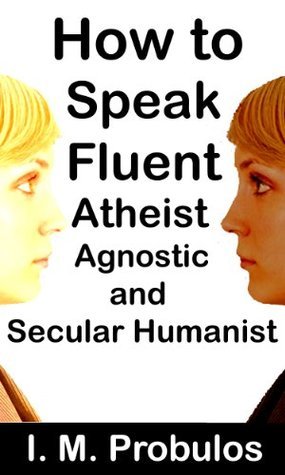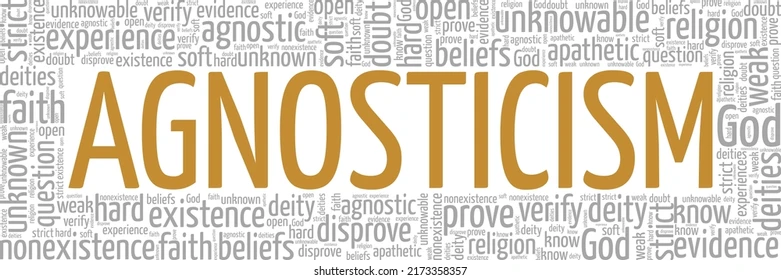The question of definitions (what is an atheist vs agnostic) and all that nonsense have been popping up again. Especially the recent exchange between Larry Moran (here, here and here) and John Wilkins (here, here, here). Before I post on this I thought it might be interesting to look at a comment Agno the Agnostic made on my post If There’s No God, What’s The Point? where I addressed [one form of] the idea that everything in life is meaningless if a god does not exist.
Agno’s stuff is in italics and my responding comment is in plain font. I’ve interspersed them and edited some of my comments for ease of reading as a standalone blog post.
Hmmm. I think what people mean when they say “what’s the point”? is that if we are basically only chemical machines that respond to external stimuli based on these chemical reactions, then we are no better than a pot of water that boils when exposed to heat (like bouncing atoms). If that is all we are, then arguments that are pro atheism are just as silly as those that are pro Supreme Being.

Hi Agno,
You might not see this since I’ve only been able to reply now which is ages since you’ve posted but I still thought it was worth doing a full response.
Yes, we are made of atoms, that is what we are but I wouldn’t say that’s “all” we are since that expresses the value judgement of disappointment that I don’t share. But regardless, how does that make “pro atheism” arguments silly?
In the end, what does being a good or bad person do if we are just a biological robot? When you die, the computer crashes and there is no memory of it either way. Those that you affect will die in time as well, and the best you can hope for is to be remembered in some historical context, not that you would care because you no longer exist.
No disagreement that when you die the best you could hope for is the memory of people which you no longer care for – but tautologically being a good or bad person does just that – the state of being a good or bad person. If that’s not meaningful during a person’s life, why is it then meaningful in an afterlife? Why does meaning require being deferred unto eternity to be activated?

Also, being contemptuous of the morals of those that believe in a “higher power” is pretty pretentious. People do or don’t do things because of consequences and our programed aversions to them. People do or don’t do things because they think they will go to Hell, or maybe because they will go to jail, or maybe because it would cause a chemical reaction that would make them have an unpleasant emotional response.
As for being contemptuous, I think for everyone there is at least someone whose morals they are contemptuous of – I don’t think it’s necessarily a bad thing. But I doubt many people are contemptuous of the morals of anyone who believes in a “higher power” simply because they do. As you said, this group is diverse with diverse moral behaviour. I might think it’s ridiculous for people to claim that as the CAUSE of their morals just as the idea that the shape of your skull is ridiculous to us. But that does not speak to having contempt for the specific morals of religious people (or believers in phrenology in the 2nd case).
The psychology of human motivation has a long way to go as a science so we probably can’t speak of “why” people do things – but we know that it’s for a complex set of reasons. We also know that a particular consequence needn’t play a crucial role. For instance, there seems to be no correlation between having the death penalty and reduced crime. Which means that it’s unlikely that people do or don’t commit a crime “because they think they will go to” the electric chair, or at least that this influence is dwarfed by other influences. But in any case, I’m not sure what you mean, are you saying that therefore the idea of hell is a useful means of social control?
For my part, I’m agnostic. Yes, that is sitting on the fence you might say, but when you look at how small each of us is, it would be pretty arrogant of me to pretend like I know one way or the other what the deal is. I am not saying I have the answers, but I am smart enough to know that I can’t discount an idea outright because neither I or anyone else on the planet could really know one way or the other.
You mention “discount[ing] an idea outright,” which I assume is what you think atheists do – but surely you can’t be serious? If I’ve ever seen someone discount the idea of a god outright it wouldn’t have been more than a few times out of hundreds, do you really think that’s the prevailing MO for an atheist?
Is there a third choice I am not aware of? Wouldn’t it be cool if we were all just stuck in a holodeck? That is just as likely as any of the religious or atheist arguments. “End program!” Damn”¦
Each of us might be small but we can still assign probabilities to any questions that arise – in the case of the universe, whether it’s a simulation or not, whether it’s one with a god or not and so on. Are you really saying we have to assign all claims of that nature are equally probable? What about the claim that the universe was created by an omnipotent god who hates squirrels and vowed before said creation to never allow them to develop?





0 Comments